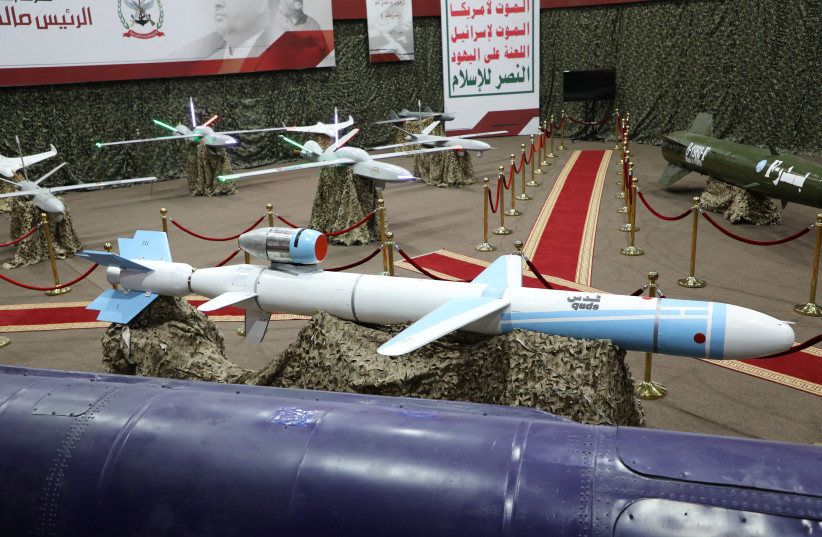Israel cannot leave Houthi threat in US hands
Sunday’s ballistic missile attack by the Houthis on Israel, the fourth within 72 hours, was proof in the pudding that the threat posed by the terrorists from Yemen, who serve at the behest of their handlers in Tehran, is real and potentially deadly.
Israelis have gotten used to obeying – or ignoring – the sirens that blare whenever the Houthis launch a missile, something they have done with increased frequency since Israel began its retaliation against Hamas for the October 7, 2023, massacre.
But Sunday’s attack demonstrated that it’s nothing to be blasé about. Eight people were wounded when a Houthi missile or a fragment of it crashed near Ben-Gurion Airport in Lod, not far from Tel Aviv.
Sources in the IDF said they didn’t know whether it was a direct crash from the missile or whether it was fragments from the missile that crashed in the area. Army Radio noted that the missile was not intercepted, despite several attempts to intercept it.
Police commander Yair Hetzroni showed reporters a crater caused by the impact of the missile beside a road near the heavily traveled Terminal 3 parking lot.

“You can see the scene right behind us here, a hole that opened up with a diameter of tens of meters and also tens of meters deep,” Hetzroni said, according to a Reuters report.
Airlines shutter flights after missile evades security systems
The IDF will undoubtedly probe the alarming failure that allowed a missile fired from a great distance in Yemen to evade both American and Israeli defense systems, setting Israel back to a period of empty skies, flight cancellations, and anticipated fare hikes among Israeli airlines.
The successful assault – so close to a coveted Israeli target as its main airport – comes two months after US President Donald Trump ordered large-scale strikes against the Houthis to reduce their capabilities to attack Israel and deter them from targeting commercial shipping in the Red Sea, where they have wreaked havoc for years.
Israel, in apparent coordination with the US, has restrained itself from retaliation to the Houthis’ aggression, allowing the Trump initiative – the biggest US military operation in the Middle East since Trump took office in January – to play out. This is in contrast to the forays conducted by the IAF following Houthi attacks during the Biden administration.
There have been nearly 700 strikes by the US from the air, often with the help of drones, on the Houthis in March and April, resulting in hundreds of casualties, but it’s unclear how much the campaign has impacted that capability, as the last three days have shown.
The appointment of a new prime minister in Yemen doesn’t appear that it will have any effect on the Houthis’ ability to launch their attacks on Israel, as Yemen’s government doesn’t control most of the country, which is occupied by Houthi gangs.
What’s evident, however, is that with the Houthis remaining unharnessed and able to do damage to the heart of Israel, Jerusalem can’t remain silent. Defense Minister Israel Katz talked tough on Sunday, saying, “Those who harm us will be hit sevenfold in return.” But action speaks louder than words.
Israel’s response must be nuanced, though, weighed in context to the broader confrontation with Iran and dependent to an extent on a green light from the White House. Israel’s policy shift, allowing Trump the opportunity to address the Houthi problem without Israeli involvement, is now being tested and should be reconsidered. Despite the best defensive capabilities, deadly missiles that are aimed to kill and destroy are bound to get through, like one did on Sunday.
The cabinet’s deliberations on what the response to the Houthis’ continued brazen acts of war against Israel should culminate in only one conclusion and plan of action: Despite the best intentions of the US, Israel must be responsible for its own security and must respond to the Houthis in the strongest possible way. It’s time to end the outsourcing.
No other country would put up with a foreign entity launching ballistic missiles at it on a daily basis. Israel shouldn’t, not for one day longer.





Comments are closed.